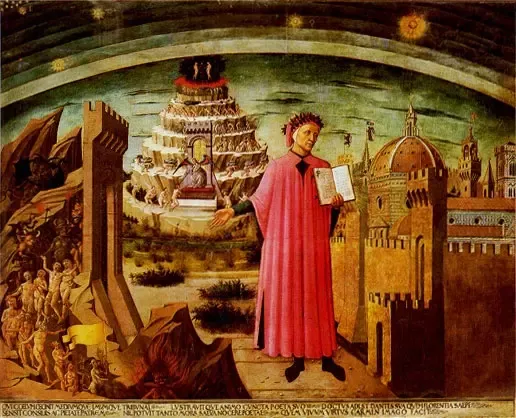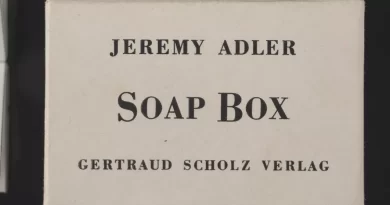The Divine Comedy by Dante Alighieri
“The Divine Comedy” is an epic poem by Dante Alighieri, a masterpiece of world literature and a fundamental work in the transition from Medieval to Renaissance thought. It is considered the greatest literary work composed in the Italian language and a classic of world literature.
Structure and Overview
The poem is divided into three parts: Inferno (Hell), Purgatorio (Purgatory), and Paradiso (Paradise). It describes Dante’s journey through Hell, Purgatory, and Paradise guided first by the Roman poet Virgil, who represents human reason, and then by Beatrice, who symbolizes divine enlightenment.
Inferno, the first part of Dante’s Divine Comedy, is structured in nine concentric circles culminating at the center of the earth where Satan is held bound. Each circle represents a sin and its corresponding punishment. The circles are concentric, representing an increase in wickedness, and culminate at the center of the earth, where Satan is held bound. The sins punished in Inferno range from the self-indulgent to the violent and the fraudulent.
Purgatorio, the second part, is structured as a climb up a mountain. At the top of the mountain is the Earthly Paradise, the Garden of Eden, where Dante meets Beatrice. The climb is an allegory for the soul’s journey to God.
Paradiso, the final part, is structured as a series of concentric spheres surrounding the Earth, representing the ascent through the celestial spheres of Heaven. It is an allegory of Christian life and, ultimately, the soul’s journey to God.
Themes and Analysis
The Divine Comedy is a deeply theological work steeped in Medieval and Thomistic philosophy and cosmology. It presents a vision of the afterlife that reflects the medieval worldview as influenced by the Church. The poem is allegorical, representing not only the physical journey of the character Dante through the afterlife but also the spiritual journey of the soul towards God.
One of the central themes of the Divine Comedy is the idea of justice. The punishments in Hell and the rewards in Heaven are directly related to the moral value of the actions performed in life. This reflects the medieval belief in divine justice and the idea that one’s actions in life directly influence one’s fate in the afterlife.
Another important theme is the power of divine love. Dante’s journey is ultimately made possible by the love of God, which guides and supports him throughout his journey. The figure of Beatrice, who guides Dante through Paradise, represents divine love and enlightenment.
Influence and Legacy
The Divine Comedy has had a profound influence on literature and culture. Its vivid and imaginative depiction of the afterlife has shaped our collective imagination of Hell, Purgatory, and Heaven. It has inspired countless artists, writers, and thinkers, from Geoffrey Chaucer to T.S. Eliot to contemporary filmmakers and video game designers.
Moreover, the Divine Comedy is a testament to the power of the human spirit and the capacity for redemption. It reminds us of the potential for transformation and growth, even in the face of adversity and suffering.
In conclusion, Dante’s Divine Comedy is a timeless masterpiece that continues to inspire and challenge readers with its profound insights into the human condition and the divine. Its rich allegorical narrative, compelling characters, and philosophical depth make it a rewarding and thought-provoking read.



